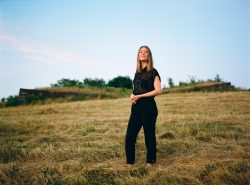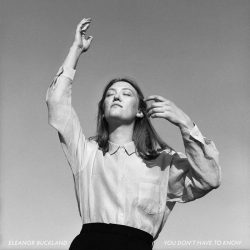You Don’t Have to Know Eleanor Buckland – but You Should
Eleanor Buckland describes her music as falling “somewhere on a spectrum of indie rock, pop, and Americana.” But first and foremost, she tells Brooklyn Roads, “I feel my music is about the song, the performance, and the connection with my listeners.” (We caught one of her two performances at this year’s Brooklyn Americana Music Festival where she did indeed connect with the audience.)
Being a fourth-generation musician and performer who grew up listening to bluegrass and folk music, “Music has been deeply part of my psyche,” she tells us. “Since my dad was a professional musician, ‘doing music’ [always] seemed like an option. As I started to run with it in high school and then into college, I had my family’s full support. I [also] had some great fiddle mentors, and attended Maine Fiddle Camp, where I got deeper into folk music.”
Her dad also introduced her to “great pop and rock music [including] Bonnie Raitt, Sheryl Crow, The Beatles and Lucinda Williams. I think you can hear those influences in my songs, for sure.” Also exerting an influence on the newly minted Brooklynite (she just moved here in April) is her adopted home borough.
“I’m so inspired by my friends and heroes who are creating and playing around me,” she says. “There are so many great places to play, and that energy in Brooklyn has been fueling my own creativity.” Among her favorite local music venues, Buckland tells us that she especially loves the vibe at Pete’s Candy Store.
She describes her forthcoming album, You Don’t Have to Know, slated for an October 29 release, as “somewhat of a departure from the music I’ve made in the past as we delved into an indie rock and pop-leaning sound.” Buckland, who has been in bands for her entire musical life (most recently the Boston trio Lula Wiles), explains that “I was discovering my singular voice as an artist in a way I never had before — and it was thrilling.”
From the beginning, Buckland adds, she and producer Adam Iredale-Gray “both felt a magical spark of synchronicity in our creative processes, and soon began working on an amorphous musical collaboration that eventually became this record.” The songs on the album “are reflections on vulnerability,” she says. “The record chronicles the experience of grappling with uncertainty, heartache, and mental illness, all the while striving to carve out an autonomous self with emotional honesty on one’s own terms.”
Regarding her future aspirations, she tells us that she would love to collaborate with Margaret Glaspy (another Brooklyn transplant) or Kathleen Edwards, “two songwriting heroes of mine.” And if Lucinda Williams were to cover one of her songs, she says, “I would probably pass out.”


